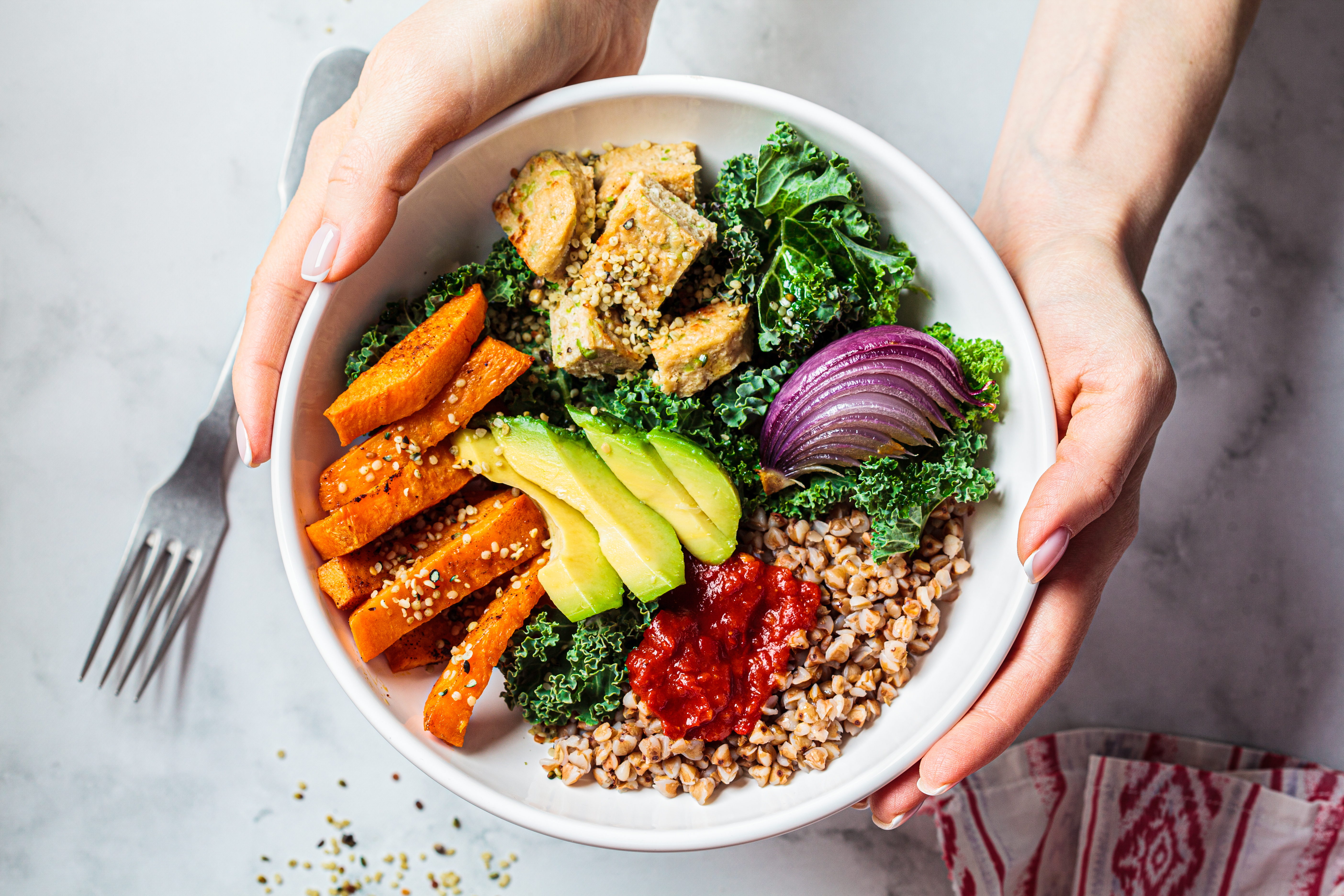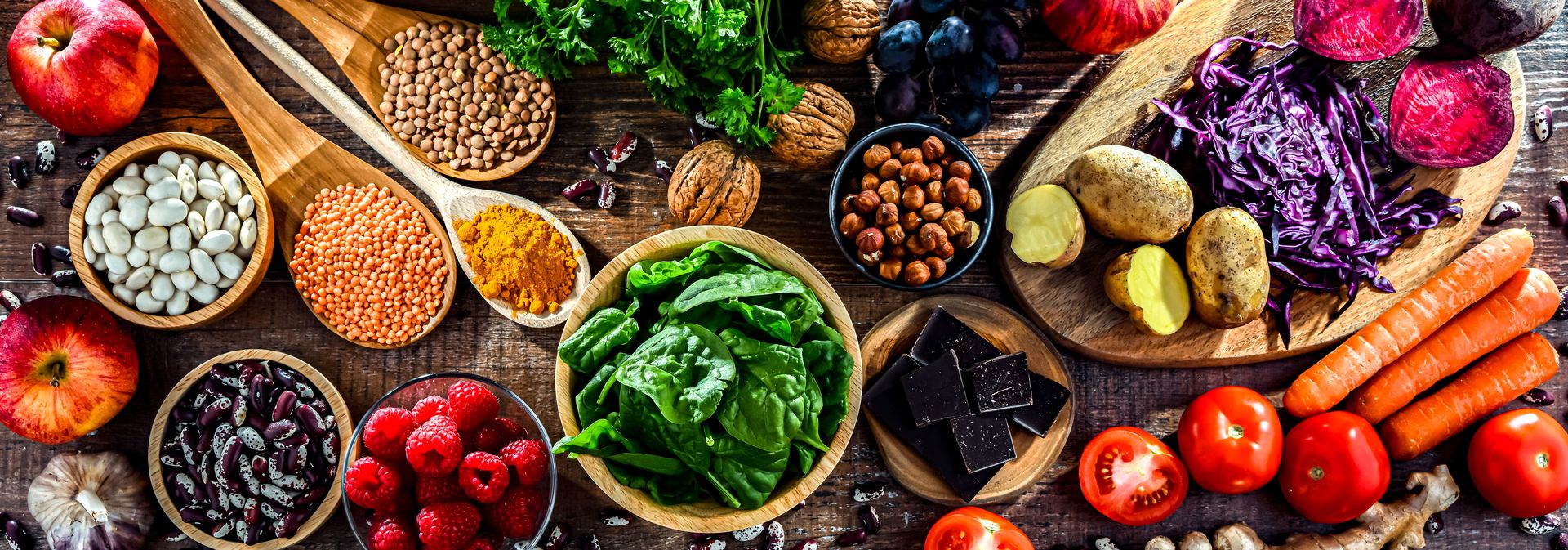Preventing cancer isn’t always possible because finding a direct cause can be difficult. But researchers have found one important thing that makes a difference: nutrition.
Nutrition can play an integral role in both preventing cancer and helping during and after treatment. Sarah Merritt, regional community outreach coordinator for Wilmot Cancer Institute’s Community Outreach at UR Medicine, and Sue Czap, a registered dietitiian with Wilmot Cancer Institute’s Pluta Integrative Oncology and Wellness Center, offer evidence-based guidance and strategies.
What research shows
Research links diets rich in plant foods—vegetables, fruits, whole grains, and beans—with a lower risk for many cancers. These foods provide vitamins, minerals, fiber, and phytochemicals that can help support your health.
Alcohol, sugar-sweetened beverages, high amounts of red meat, and processed meats are associated with higher cancer risk and are best limited or avoided.
What to eat to reduce cancer risk
Rather than short-term diets, UR Medicine experts encourage a focus on life-long eating patterns.

Make plants the main course.
Aim for a plate that’s mostly vegetables, fruits, whole grains and beans, with animal protein as a smaller side. The American Institute for Cancer Research recommends that animal-based proteins make up no more than about one-third of the plate.
Eat foods close to their natural state.
Try to pack your cupboards and refrigerator with whole, minimally processed foods. The closer a food is to its natural state, the more nutrients it holds. Avoiding ultra-processed foods can help limit unnecessary added sugar, salt, and unhealthy fats.
Limit alcohol.
Consumption of alcohol can increase cancer risk. The safest option according to the American Cancer Society is to limit alcohol or not drink it at all.
Nutrition during cancer treatment
The body’s needs are very individualized during cancer treatment. It can change during chemotherapy, radiation, and after surgery.
At UR Medicine, oncology dietitians work closely with patients and their medical team to help:
- Maintain weight and hydration
- Get adequate protein to help meet increased needs during cancer treatment
- Manage treatment-related side effects such as nausea, taste changes, diarrhea, or constipation
As oncology dietitians, we work in a supportive role in terms of helping patients stay strong and keeping their bodies well-nourished during treatment.”
Managing common side effects with food
Some of the most common modifications during cancer treatment include:
- Nausea: Try ginger and mild flavors in smaller, more frequent meals.
- Taste changes: Add extra flavors with citrus, vinegars, condiments, and herbs. A baking soda-salt rinse can also help reset or cleanse the palate.
- Diarrhea: Increase fluids and choose more soluble-fiber foods such as bananas, applesauce, oatmeal, and mashed potatoes.
- Constipation: Increase fluids, insoluble fiber, and physical activity if possible.
Nutrition needs vary from person to person, so Czap encourages patients to reach out directly for support.
Study Indicates Diet Helps with Advanced Breast Cancer
A small study by researchers at the University of Rochester Medical Center and Wilmot Cancer Institute showed plant-based diets helped patients feel sharper mentally and generally better.
See the clinical trial results
Common myths—sugar, carbs, and soy
Contrary to content circulating on the internet, it isn’t necessary to completely remove carbohydrates, sugar, or soy from your diet.
“The focus should be the quality and portion of carbohydrates. Choose whole grains such as brown rice, quinoa, or farro, and balance them with healthy fats and protein,” said Czap.
Whole soy foods have been proven safe, and while it’s important to limit foods and drinks with added sugars, natural sugars such as those found in whole fruit are part of a healthy diet.
UR Medicine’s Approach
UR Medicine offers a range of programs to support patients during cancer treatment, including:
The classes encourage attendees to find joy in cooking and eating food, and show how it can become a source of connection with others. Having a support system during cancer treatment is key, and patients are welcome to bring partners and family members to sessions. Many referrals come from the medical team, but patients may self-refer.
Pluta Integrative Oncology and Wellness Center
The Wellness Center helps patients manage symptoms, improve their quality of life, and feel more in control of their care.
Learn more
link

